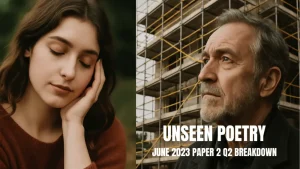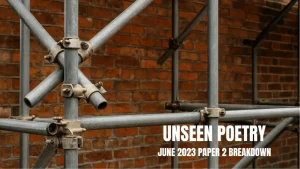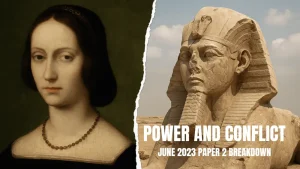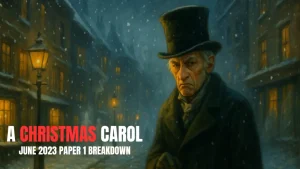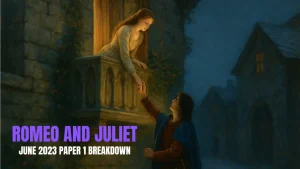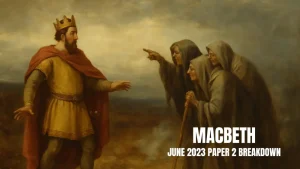How does Priestley present the different ways older and younger characters respond to the Inspector?

In An Inspector Calls, J.B. Priestley presents a stark contrast between how the younger and older generations respond to the Inspector, using this generational divide to expose differing attitudes to responsibility, guilt, and social change. Through the idealistic and open-minded reactions of characters like Sheila and Eric, and the rigid, self-justifying responses of Mr and Mrs Birling, Priestley critiques the older generation’s resistance to change. His intentions are deeply rooted in the context of post-war Britain, as he encourages audiences to reflect on how society must evolve towards collective responsibility. In this essay, I will explore how Priestley uses dramatic techniques, characterisation, and generational conflict to highlight this central theme.
Priestley uses Sheila to represent the younger generation’s capacity for growth and moral awareness. From the moment she learns of her role in Eva Smith’s dismissal, she shows genuine remorse, saying, “I know I’m to blame – and I’m desperately sorry.” This immediate acceptance contrasts with the defensiveness of the older characters. The use of the word “desperately” conveys deep emotional regret, and the personal pronoun “I” highlights her willingness to take individual responsibility. Priestley uses Sheila to reflect his belief that younger people are more capable of change, especially in the context of post-war Britain, where he hoped a new generation would build a fairer society.
Like Sheila, Eric undergoes significant character development in response to the Inspector. Initially portrayed as immature and evasive, Eric ultimately accepts his wrongdoing: “The fact remains that I did what I did.” The repetition of “I did” shows that he takes ownership of his actions, unlike his parents who continue to deny accountability. The blunt tone and monosyllabic language emphasise his emotional maturity and moral clarity by the end of the play. Priestley uses Eric’s confession to challenge traditional notions of masculinity and upper-class entitlement, suggesting that meaningful change requires self-awareness and acceptance of social duty .
In stark contrast, Mr Birling represents the older generation’s refusal to accept responsibility. From the outset, he dismisses social duty, claiming, “A man has to mind his own business.”. Priestley’s use of dramatic irony in Birling’s earlier speech – where he wrongly predicts that there will be no war and the Titanic is “unsinkable” – undermines his authority and reveals his ignorance. Mr Birling’s capitalist mindset is rooted in pre-war Edwardian values, which prioritised wealth and status over social care.
Priestley presents Mrs Birling as a symbol of cold authority and social superiority who refuses to learn from the Inspector’s message. She insists, “I’m sorry she should have come to such a horrible end. But I accept no blame at all.” . Her refusal to acknowledge her role in Eva Smith’s suffering shows how the older generation clings to social status and moral superiority. The contrast between the emotive phrase “horrible end” and her unemotional tone highlights her hypocrisy and detachment. Priestley uses her character to critique the lack of compassion in the upper classes, particularly among women who were expected to uphold charitable values but often failed to act with real empathy.
Priestley uses the generational divide to symbolise the wider conflict between tradition and progress. This is clearest at the end of the play, when the younger characters express guilt and a desire to change, while Mr and Mrs Birling celebrate that the Inspector “was probably a fake” and that everything can “go back to normal.” The phrase “go back to normal” shows their eagerness to maintain their power and ignore uncomfortable truths, while the Inspector’s warning that “millions and millions and millions of Eva Smiths and John Smiths” exist acts as a final moral blow. Through this, Priestley emphasises that social responsibility is timeless and urgent—highlighting the dangers of ignoring the voices of the vulnerable in both 1912 and post-WWII society.
Ultimately, Priestley presents a powerful contrast between the older and younger generations in their responses to the Inspector’s message. While the younger characters like Sheila and Eric show personal growth, acceptance, and a desire to change, the older characters remain proud, dismissive, and stuck in the past. Priestley deliberately uses this divide to highlight his intention: to encourage a more compassionate, collective approach to social responsibility. Through dramatic irony, emotive language, and character development, Priestley ensures the audience reflects on the kind of society they want to live in. In the end, An Inspector Calls acts as a warning—and a call to action—for all generations.
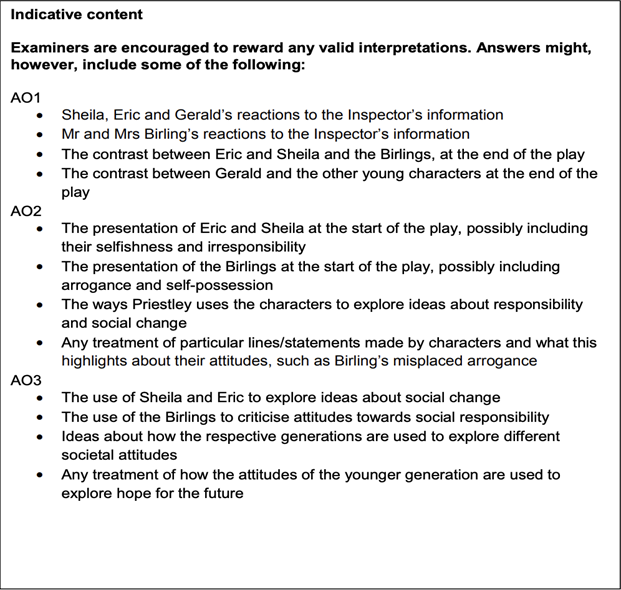
AO1 – Respond to the text with understanding and support your ideas with evidence
What it means:
-
- You need to show knowledge of the play, including its plot, characters, themes, and context.
- You also need to express your own ideas clearly and back them up with relevant quotations or references.
In your essay on An Inspector Calls, you should:
-
- Give a clear argument or viewpoint about the question (e.g., “Priestley presents the Inspector as a voice of social responsibility”).
- Use quotes or close references to support what you’re saying.
- Keep your ideas focused on the question.
Example:
“Priestley presents Mr Birling as arrogant and shortsighted. For instance, he claims that the Titanic is ‘unsinkable, absolutely unsinkable,’ which shows his overconfidence and lack of awareness—making him appear foolish to the audience.”
AO2 – Analyse the writer’s methods (language, structure, form) and their effects
What it means:
-
- You need to explore how Priestley writes, not just what he writes.
- This includes language choices, dramatic structure, characterisation, stage directions, form (as a play), and symbolism.
In your essay:
-
- Comment on the specific techniques Priestley uses (like irony, contrast, foreshadowing, repetition).
- Explain the effect on the audience or reader.
Example:
“Priestley uses dramatic irony when Mr Birling says that war will not happen. The audience, who knows that WWII did occur, sees Birling as naive. This reduces his credibility and supports Priestley’s criticism of capitalist figures.”
AO3 – Show understanding of the context in which the text was written and set
What it means:
-
- You must understand when the play was written (1945) and when it’s set (1912).
- Explore how the social, political, and historical context influences the play’s characters, themes, and audience reaction.
In your essay:
-
- Refer to context where relevant, not as a list of facts but to deepen your argument.
Example:
“Priestley sets the play in 1912, before WWI and the sinking of the Titanic, to highlight how little people like Mr Birling understood about the future. Writing just after WWII, Priestley wanted a 1945 audience to see the dangers of selfishness and the need for social responsibility.”
AO4 – Use accurate spelling, punctuation, and grammar
What it means:
-
- Your writing should be clear, accurate, and well-organised.
- You should use a formal academic tone, proper paragraphing, and correct SPaG (Spelling, Punctuation, and Grammar).
Tips:
-
- Write in full sentences, avoid slang, and aim for clarity.
- Use topic sentences to guide each paragraph.
- Always proofread your work if you have time.
Watch Video Breakdown
This video provides a detailed walkthrough of a Level 6 model answer to the 2023 AQA Literature Paper 2 question on An Inspector Calls. The question explores how Priestley presents the different ways older and younger characters respond to the Inspector. The video unpacks how a top-level response demonstrates high-level interpretation, sustained analysis, and conceptual engagement with Priestley’s message.
Key areas covered include:
-
-
A strong thesis exploring the generational divide as a vehicle for Priestley’s critique of social responsibility, guilt, and resistance to change.
-
Detailed AO1, AO2, and AO3 analysis across all major characters, particularly Sheila, Eric, Mr. Birling, and Mrs. Birling, with close attention to language, structure, tone, and dramatic technique.
-
Insightful exploration of Priestley’s use of dramatic irony, emotive language, and rhetorical climaxes—particularly through the Inspector—to reinforce his socialist message and critique Edwardian class and gender norms.
-
Evaluation of Priestley’s post-war intentions, encouraging 1945 audiences to reflect on collective responsibility and the need for societal reform.
-
Clear comparisons between Level 6 and Level 4 responses, highlighting differences in contextual integration, analytical depth, conceptual thinking, and critical insight.
-
This breakdown helps students understand how to construct a conceptualised argument, embed context meaningfully, and sustain high-level analysis and evaluation throughout their essay.
 Alex Sharp is a seasoned English specialist with over a decade of experience teaching and examining GCSE English Literature and Language. As an AQA examiner, Alex has marked thousands of scripts, gaining deep insight into what examiners look for and...
Alex Sharp is a seasoned English specialist with over a decade of experience teaching and examining GCSE English Literature and Language. As an AQA examiner, Alex has marked thousands of scripts, gaining deep insight into what examiners look for and... 